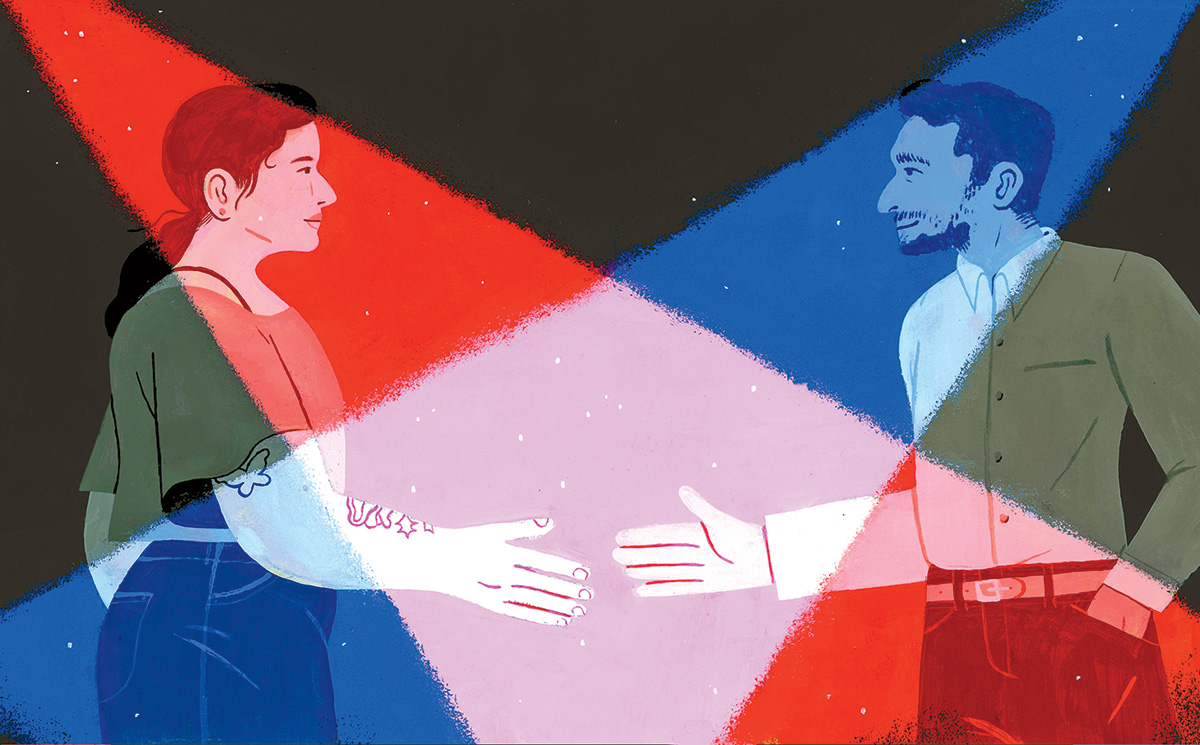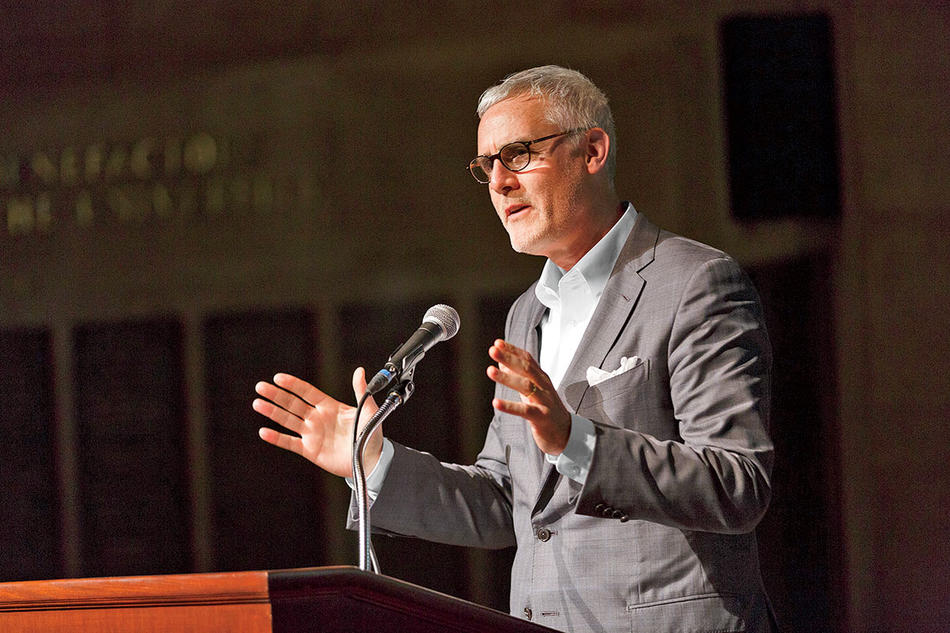Peter T. Coleman ’97TC, a professor of psychology and education, is the founding director of both the Difficult Conversations Lab at Teachers College and the Advanced Consortium on Cooperation, Conflict, and Complexity (AC4) at the Earth Institute. His research focuses on helping people with opposing viewpoints learn to talk about sensitive topics.
Tell us about your work.
Practitioners in the field of conflict resolution have long recognized that some types of conflict resist almost any attempts to address them. Whether between family members, ethnic or religious groups, communities, or countries, some conflicts endure for years or decades, worsening over time, exhausting the participants and locking them into patterns of destructive behavior.
In 2004, I began to lead interdisciplinary teams of researchers — including social psychologists, political scientists, physicists, and complexity scientists — who study the internal dynamics of these situations. At Columbia’s Difficult Conversations Lab, we investigate the circumstances under which dialogue can help promote mutual respect and empathy in people with opposing political viewpoints or, depending on how their conversations are managed, drive them further apart. This work, together with our analysis of real-world conflicts, has led us to identify several key qualities that the worst conflicts share. And by analyzing how seemingly intractable conflicts occasionally do get resolved, we’ve developed guidelines and principles for addressing them.
What kinds of conflicts have you looked at?
We’ve analyzed long-simmering ethnic tensions in places like Israel, Palestine, Kashmir, and Cyprus, as well as violent conflicts that have been peacefully resolved in Mozambique, Northern Ireland, and South Africa. At the Earth Institute’s Advanced Consortium on Cooperation, Conflict, and Complexity, I oversee research that aims to shed new light on armed conflicts by examining how some nations are able to end such troubles or avoid them altogether, maintaining peaceful relations among their citizens and with other countries, even in unstable regions like the Middle East and West Africa. In the US, we’ve looked at gang rivalries, disputes involving accusations of racial discrimination in universities and other workplaces, and political contempt between Republicans and Democrats.
What could a gang dispute possibly have in common with partisan politics?
More than you’d think. First, each of these enduring conflicts, from the interpersonal to the geopolitical, is driven by many factors that reinforce one another. For this reason, the conflicts tend to grow increasingly complex and unpredictable. One of the really interesting observations we’ve made is that as these quagmires persist and get more complicated and confusing, the participants actually tend to view them in simpler and simpler terms. Eventually they adopt a clear-cut us-versus-them perspective, seeing themselves as entirely in the right and their “enemy” as completely in the wrong. This is the result of a natural psychological impulse: we try to make sense of complex experiences by simplifying them. It relieves the anxiety we’d otherwise feel as a result of not knowing how to respond. Once this happens, a conflict can really get locked in, with both parties embracing rigid, polarized understandings of the problem; feeling rage, hatred, and a sense of victimization; and caring as much about inflicting harm on the other side as achieving their own goals.
How do you even start to deal with a conflict that has become so hardened?
The first step, we’ve found, is to help the disputants begin to recognize some of the nuances and moral complexities of the situation again. This is usually best achieved through dialogue — by sharing personal accounts of an experience and hearing one another — rather than debate, which is a more closed cognitive process aimed at winning an argument. Dialogue can open people up to learning and feeling new things; debate usually doesn’t.
In your forthcoming book, The Way Out: How to Overcome Toxic Polarization, you focus on US politics. What drew you to the topic?
By some measures, Americans are more deeply divided, politically and culturally, than we have ever been before in our history. The situation has now reached a pathological state. You can see this in voting patterns in Congress, where Republicans and Democrats rarely cross the aisle to support one another’s bills, which means they’re getting almost nothing done. You can see it in the loss of decorum in the Senate and in the deterioration of civil discourse in general. And you can see it in the attitudes of ordinary Americans, who have grown more loyal to their own party and more contemptuous toward people on the other side. The Pew Research Center has good data on this. They periodically conduct surveys in which they ask Americans questions like “Would you support a relative marrying a member of the other party?” and whether they consider members of the opposing party unintelligent, closed-minded, immoral, unpatriotic, or lazy. They find that the level of enmity, distrust, and hostility that Republicans and Democrats now feel toward each other is at a historic high. More alarmingly, researchers at Louisiana State University and the University of Maryland recently found that 18 percent of Democrats and 13 percent of Republicans would condone violence if their party loses the presidential election in November. This is dangerous territory we’re entering. We really need to reset this relationship. And some of the principles of conflict resolution that my team has developed, I think, can help.
What do you bring to the conversation?
Other academics, when examining hyper-partisanship in the US, have tended to look for a root cause of the problem. For example, many have argued that the source of the conflict is our politicized news landscape, where conservative and liberal TV networks only highlight information that confirms their audiences’ biases. Others have blamed social-media platforms and the ideological echo chambers that they create. Still others point to gerrymandering, which has reduced the competitiveness of many elections and given candidates less incentive to appeal to political moderates. I believe that all these factors, and probably dozens of others, are fueling the situation. This is how difficult, heated, entrenched conflicts work: they don’t have a single root cause but are extraordinarily complex. And this means they require messy, multifaceted solutions. This flies in the face of received wisdom in the social sciences, which has long held that the simplest, most elegant solutions are best. Policymakers, too, tend to look for simple, easy-to-grasp answers to problems. But my colleagues and I have found that highly complicated and emotionally charged conflicts don’t respond to simple solutions. So it won’t be enough for the next US president to project a unifying spirit — or for Facebook and Twitter to crack down on misinformation. If Americans are to escape this cycle of escalating political hostility, we need to hit the problem with everything we’ve got.
Where would you start?
I’d like to see a US president appoint members of the opposition party to his or her cabinet. Abraham Lincoln stocked his cabinet with many political rivals, because he thought it was important to have the country’s smartest and most creative people, regardless of ideology, in the room with him discussing policy. I’d like to see congressional leaders of both parties require their members to live in Washington, DC, for most of the year and to socialize with one another regularly, in order to cultivate personal bonds and bipartisan cooperation. I’d like to see more states adopt ranked voting, where people indicate the order in which they prefer multiple candidates, since this encourages politicians to appeal to a broader swath of the electorate and not only cater to their party’s base. And I’d like to see more done to build bridges between ordinary Americans, so that conservatives and liberals are reminded of one another’s humanity and learn to treat each other civilly again. These are just a few of the levers that, over time, may help shift the tide.
You recently joined forces with a nonprofit group called Unite, which is led by the activist Timothy Shriver, to promote inter-party dialogue.
Yes, I am working with Unite to take stock of efforts that are already underway to promote solidarity between Republicans and Democrats, with an eye toward identifying programs that could be scaled up to serve more people. There are currently hundreds of community-based organizations running programs that bring people together to discuss politics, in hopes that they’ll gain a more nuanced understanding of one another’s views. There are also a number of initiatives happening in what I call “influence sectors,” like journalism, TV, film, social media, education, law, and governance. So we’ll be mapping the ecology of this nascent solidarity movement and looking for ways to help it grow.
A lot of the existing initiatives use communication strategies inspired by your research.
For many years, my team at the Difficult Conversations Lab has been conducting experiments to determine how best to frame information about polarizing issues so that both Republicans and Democrats will assimilate it and be willing to engage in open-minded dialogue about it. We do this by inviting people with opposing political viewpoints into our lab, presenting them with a written statement we’ve prepared about how conservatives and liberals tend to think about an issue like abortion, immigration, or gun control, and then asking them to discuss the statement. We’ve found that when the statement is rather simplistic, describing the opposing viewpoints in stark, dichotomous terms, the participants often get frustrated, impatient, and argumentative. But when the statement is more nuanced — emphasizing the ethical, moral, legal, and economic complexities of the topic — people are likelier to listen to each other and have a fruitful conversation.
So, yes, some dialogue-facilitation groups are now using framing techniques based on our lab work. Journalists and other media professionals are paying attention too. For example, I often speak to journalists about how to write more effectively about polarizing topics like climate change. I tell them: “You don’t have to lead with the political debate about global warming in every story, because that can just make climate skeptics feel defensive and lead them to dismiss everything else in your article. Skip ahead to the more nuanced aspects of the issue, like those pertaining to climate solutions, and more of them will listen to you.”
What would you recommend we do in our daily lives to foster better communication?
I would suggest that you seek out three respected thinkers who are on the opposite side of the ideological spectrum but whom you find reasonable and intellectually honest and follow them on Twitter or Facebook. Make a point of interacting with people whose lives and backgrounds are very different from your own. And bear in mind that no matter how smart you are and no matter how sure that the truth is on your side, we’re all prone to what psychologists call confirmation bias, which means that we’re likelier to absorb information that supports what we already believe. So approach your conversations with some humility.
I can imagine that social activists — liberal and conservative alike — might wonder if achieving bipartisan harmony will require us to compromise our ideals.
Not necessarily. I’m not saying we need to eliminate conflict. Conflict is a healthy part of life, so long as we’re able to manage it well and not let it make us crazy. Conflict is how we learn and grow — as individuals and as a nation. What I’m saying is that political polarization in the US has reached a point where we’re no longer constructively negotiating our differences. We’re not listening to each other, we’re not growing, and God knows we are not addressing our most critical problems. We’re just at loggerheads. We’ve come to detest one another, and we’re shutting down. We need to learn to talk again.




